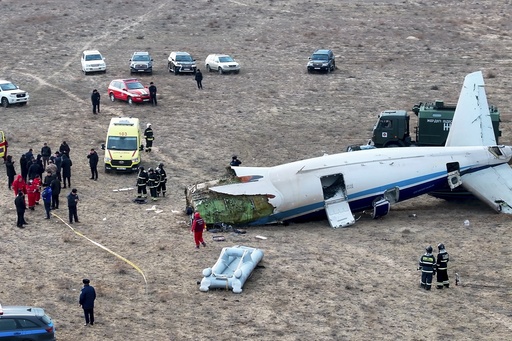An airliner from Azerbaijan carrying 67 passengers tragically crashed near Aktau, Kazakhstan, on Wednesday, resulting in 38 fatalities and 29 survivors, as confirmed by a Kazakh official. The figures were shared by Deputy Prime Minister Kanat Bozumbaev during a meeting with Azerbaijani representatives, as reported by various news sources.
The aircraft, identified as an Embraer 190, was making its way from Baku, Azerbaijan’s capital, to Grozny, a city in Russia’s North Caucasus region. However, it was diverted due to adverse weather conditions and attempted an emergency landing just 3 kilometers (approximately 1.8 miles) outside of Aktau, as indicated by Azerbaijan Airlines.
Azerbaijani President Ilham Aliyev discussed the situation at a news conference, asserting that it was premature to draw conclusions regarding the reasons behind the incident. However, he noted that the flight had altered its route due to poor weather and was attempting to land at Aktau airport when the crash occurred. “Information I received suggests that changing weather conditions forced the plane to deviate from its intended path between Baku and Grozny, leading it to crash,” he stated.
Russia’s aviation authority, known as Rosaviatsia, provided preliminary insights suggesting that the pilots made their diversion to Aktau following a bird strike, which prompted an emergency situation on the plane. Reports indicated that of those on board, 42 were Azerbaijani, 16 were Russian, six were Kazakhstani, and three were citizens of Kyrgyzstan. Although Azerbaijan’s prosecutor general’s office initially reported that 32 survived, this number is expected to be revised.
Videos circulating on social media appeared to capture the moments leading up to the crash, showing the aircraft in a sharp descent before colliding with the ground and erupting into flames. Other footage depicted parts of the plane detached from its wings, lying overturned in the grass. Some clips also showed survivors assisting fellow passengers away from the wreckage.
Flight-tracking data illustrated the plane’s erratic movements as it approached Aktau, creating a figure-eight pattern and exhibiting significant variances in altitude shortly before the accident. Additionally, FlightRadar24 mentioned issues with “strong GPS jamming,” which they claimed caused the aircraft to send inaccurate data. Historically, Russia has been implicated in jamming GPS signals in the region.
In response to the incident, Azerbaijan Airlines announced that it would keep the public informed and suspended flights between Baku and Grozny, as well as Baku and Makhachkala, in Russia’s North Caucasus until the investigation concludes. The airline also altered its social media branding to a solid black to mourn the tragedy.
Azerbaijan’s state news agency reported that an official delegation, including the emergency situations minister, deputy general prosecutor, and vice president of Azerbaijan Airlines, has been dispatched to Aktau to conduct a thorough investigation on-site.
President Aliyev, originally en route to Russia, returned to Azerbaijan shortly after hearing news of the crash. He was scheduled to participate in an informal meeting with the Commonwealth of Independent States leaders in St. Petersburg. In his public statement, he expressed his condolences to the victims’ families and declared a day of mourning on December 26 in Azerbaijan.
Russian President Vladimir Putin reached out to Aliyev to convey his sympathies, and during a meeting in St. Petersburg, he mentioned that Russia’s Emergency Ministry sent a plane equipped with medical personnel and tools to assist Kazakhstan following the disaster.
Authorities from Kazakhstan, Azerbaijan, and Russia have all committed to investigating the crash. Embraer has expressed its readiness to support the relevant authorities as they work through the incident.
